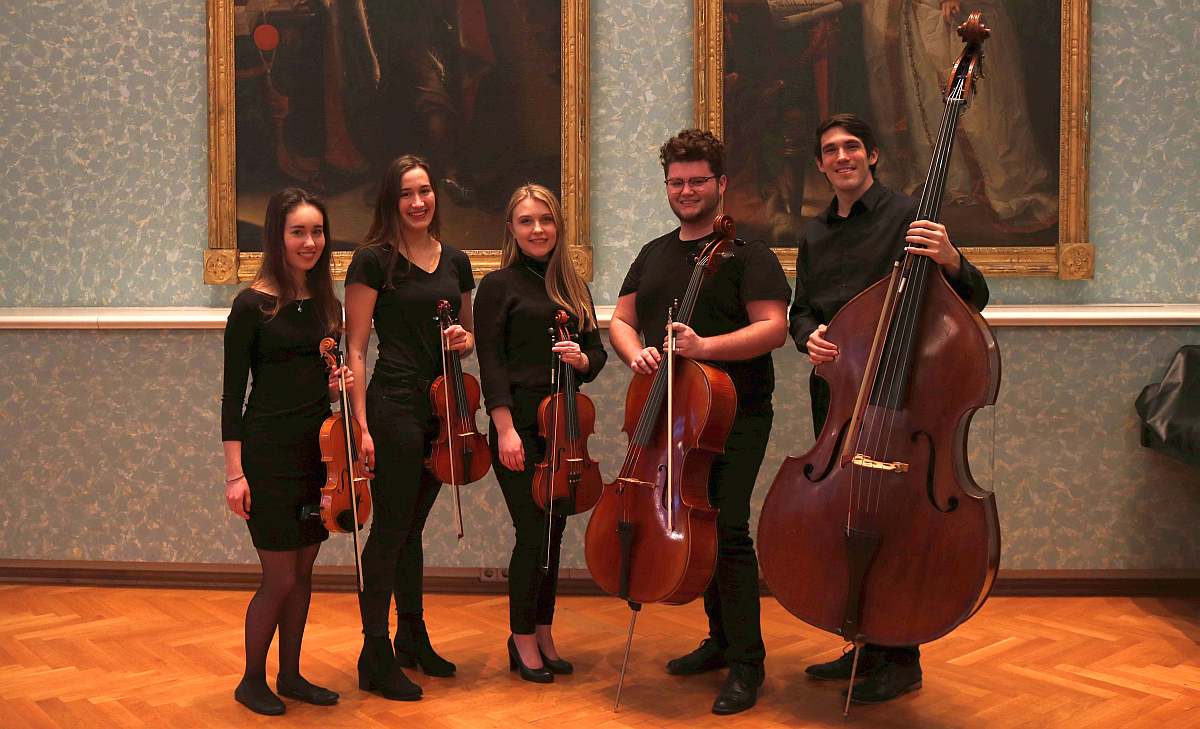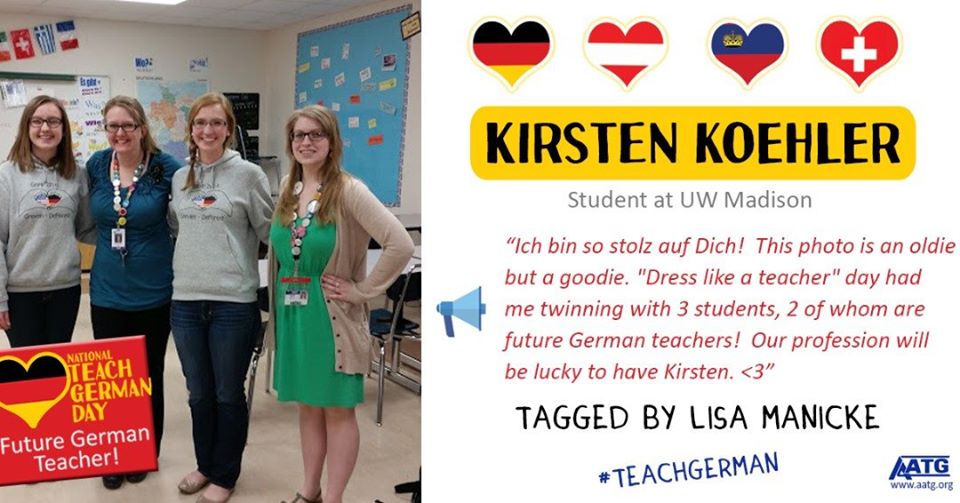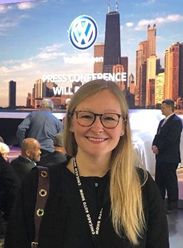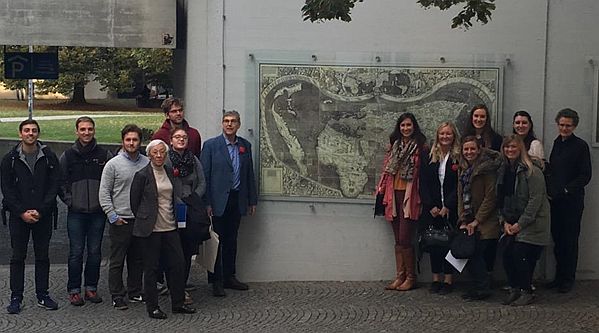
AYF Concert ~American Folk Music: Ein Transatlantisches Erbe
2019-06-05
Internship Profile: Kirsten Koehler
2019-12-18Alumni Profile: Erica Panah (née Cameron)

Erica Panah (neé Cameron) was part of the 2006-2007 AYF cohort. She graduated from UW-Madison in 2008 and currently works as the Executive Coordinator at Volkswagen of America, Inc., in the electric vehicles department–called E-Mobility and Innovation–which is based in metro Washington, DC.
Do you remember arriving in Freiburg?

Yes! The German Department in Madison offered a few in-person sessions before we went to Germany, so that we had the opportunity to meet future classmates prior to starting the program. Because of this, I already knew some of the AYFers who were on the same flight from Chicago to Frankfurt, so that made jumping into the new experience fun right off the bat. I believe that very first evening we all met up at the StuSie bar. No time for jet lag!
What was one of your biggest worries and how did you get over it?
My biggest fear developed later on in the year, as the date approached for my first Referat (presentation) in my Political Science class on Einwanderungspolitik (Immigration Policy). The idea of conducting a thirty minute presentation entirely in German (on a heavy topic) to the native-speaking university students was something that I simply did not believe I could do. However, the date was approaching and I had no choice but to rise to the challenge. In order to better prepare, I asked one of my German friends I met in that class if she would be willing to be a Tandempartner, or a language partner. We met for coffee and spent part of the time speaking exclusively in German and then we would switch to English so that she could also practice. This experience really helped me feel prepared for my presentation.
What’s a favorite memory of your year in Freiburg?
The welcoming reception at the Greifenegg Schlössle took place on one of the first nights we were there. We were welcomed by the president of the Freiburg-Madison Gesellschaft, Toni Schlegel, and the Mayor of Freiburg. It was a perfect summer evening with beautiful views of the city. Everyone was just so happy to be there, and it was the beginning of a great adventure!
Did you have any favorite courses?
Favorite courses were the Politics of Studiengebühren (tuition). It was an interesting time to take this class because that semester was the first time the University had introduced a controversial 500 euro tuition per semester. The class also compared different countries’ tuition policies.
In addition, I took a class on medieval architecture. This was a class specifically offered to AFYers. We learned about medieval architecture by going to historic buildings, such as the Münster. There is something fully immersive in the process of learning words for the first time in a foreign language before knowing the technical terminology in English, such as Strebepfeiler (flying buttress).
What helped you make the most of your year in Freiburg?
For me, it was not what but who.
I made lifelong friends through this program. All of us were the same age and really bonded over the challenges of being a foreign student at a prestigious German university and the excitement of exploring different parts of the country and continent.
Ulli was and is still an incredibly supportive program director. No matter what type of issue you might have been going through, whether it had to do with your studies, your living situation, a personal matter; his door was always open. A few of us organized a ten year reunion and we reached out to Ulli to check on dates and make sure we would see him while we were there. He came back to us with a full program including a welcome reception with keynote speeches by Albert Ludwig’s Uni professors, a Stammtisch with current AYFers, a University museum tour, and a special wine tasting and dinner at a local organic vineyard. We were so grateful for his kindness and guidance.
Here’s a photo from the 10 year reunion in 2016:

We hope to organize a 15 year reunion in 2021!
How has your year in Freiburg impacted/enriched your life? Be specific.
It has had an immensely positive impact on both my personal and professional life. I have developed deep lifelong friendships with fellow AYFers. I ended up marrying a German man; not one I met in Freiburg, but I certainly believe that having lived in Germany has helped us bridge some culture gaps. In my opinion, there is a depth of understanding you can only achieve by living in a country for some time: going to school there; grocery shopping and learning to cook local dishes; seeing a doctor; being welcomed into a German family’s home; having German friends, etc.
Professionally, I do not believe I would have the fulfillment I currently have in my career if I didn’t have the German skills that I honed while I was in Freiburg. In my daily work, I receive emails, calls, and presentations in German. I feel like I have quickly gained the respect of my colleagues in Wolfsburg because of my German skills.
How did you decide to apply/participate in the program?
One of my undergraduate majors was International Studies, so I visited the Study Abroad office right away when I got to college. I was absolutely certain that I wanted to study abroad. The year-long AYF program immediately appealed to me. I pretty much knew that my junior year would be spent in Freiburg from the very beginning of my college years.
Do you feel that studying abroad gave you an advantage in the job market?
Yes! I would not speak, read, or write the level of German I do now, if I had not studied abroad. Also, I find that there are aspects of one’s resume, such as a study abroad experience or language skills, that make you distinctive and can often spark a very candid open discussion, in interviews, for example. It is a unique experience that can help you connect with others.
What drew you to the e-mobility sector?
There is not a short answer for this question, but I would start with, no matter how indirect my path was getting here, I feel fortunate about the way everything has worked out.
I always knew that I loved the German language: loved learning it, speaking it, the culture; but I did wonder if I would be able to use it professionally or if it would simply be a lifelong hobby / passion of mine. To be honest, I would have been fine if it just remained something in the background of my life, but I definitely hoped for German to be at the forefront. I pursued a Master’s in International Economics at John Hopkins, because I believed that it would equip me with a set of quantitative skills so that I could one day work for a large German company. I thought of brands like BMW, Bosch, and Siemens, to name a few. However, after I graduated, I didn’t have any direct connections into these extremely large, complex giants of companies; I didn’t know where to begin. When I would browse the Careers section on their websites, there was what seemed to be about 10,000 specialized engineering or technology positions; none of which I was qualified for.
So, I decided that I could be happy working at a large global company, even if I couldn’t use my German, because it would be a multi-cultural workplace with internationally-minded employees. Before Volkswagen, I was working at a large global energy company (distributing and generating green energy and renewables) and that was where I acquired my appetite for working in innovative, progressive environments. The company was very agile, always focused on growth, ideas, and the future. When it was time for my next step, I was thrilled to find out that Volkswagen had a vacancy in the electric vehicles department. I thought that joining a team focused on innovation would be a place where – even though, I wasn’t coming with a background in engineering, design, or digital expertise – I would be able to potentially influence the products we are producing and selling. I imagined an openness to new ideas in a department focused on the cutting edge of technology. When making different product decisions for VWs future electric vehicles, it is important to appeal to people with various tastes, needs, etc. I am a person with my own opinions, style, and features I enjoy, or wish to have in my car, and during meetings, I can share these preferences as a potential buyer. This is a very fun part of the job.
I learn something new every day and I enjoy the challenge. There is no question that my German skills were what got my foot in the door at Volkswagen.
What can you tell us about electronic and self-driving cars that we might not already know?
Electric cars are generally safer and provide more space!
How are they safe? Very simply: electric cars do not use gasoline, which is a highly flammable liquid; and therefore, there are fewer gas fires. In addition, electric motors have significantly fewer parts than combustion engines. Therefore, there is less mechanical failure, which can be a critical contributor to accidents. Further, without having an engine in the front of the vehicle, in an electric car you have space you wouldn’t have in an ICE (internal combustion engine) vehicle; and that space can be dedicated to safety components.
How do they provide more space? Typically, on electric vehicles, the battery is installed in the vehicle floor. This is the case in the platform that Volkswagen uses, called MEB (Modularer Elektrobaukasten). As mentioned above, electric cars have much fewer mechanical parts and with the battery positioned at the bottom of the car, this creates extra cargo capacity, i.e. more space!
Erica shared her story via the AYF Alumni Profiles Project page. We welcome your contribution to our communal story telling! ~ With editing by Kelly Baldwin Heid (AYF 05-06).

